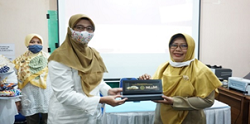Pelatihan Metode Pembelajaran dalam Jaringan di SD Muhammadiyah Sokonandi Yogyakarta (Daring GGZ)
Daring GGZ - Training of Online Learning Method at Muhammadiyah Sokonandi Elementary School
DOI:
https://doi.org/10.33084/pengabdianmu.v7i3.2880Keywords:
Online Learning, G-Form, SD Muhammadiyah Sokonandi, Zoom, Google MeetAbstract
The Covid-19 pandemic is not just about health issues but also about social issues, one of which is the world of education. For that is necessary to use other alternative media in learning using the internet. However, some teachers are not proficient in using and operating online platform applications. Changing the way of learning requires teachers to know information technology. For this reason, training activities were held using the G Form, Google Meet, and Zoom applications to increase knowledge in using these platforms. This activity was carried out at SD Muhammadiyah Sokonandi, involving 18 teachers in classes 1-3. Methods for implementing this activity include planning, implementation, and evaluation. In the planning stage, the activity program is first drawn up. At the implementation stage, the training participants were given a pre-test, practical presentation, and mentoring accompanied by modules and ended with a post-test. In the final stage, data analysis was carried out using Microsoft Excel. The results of this activity indicate an increase in the understanding of class 1-3 teachers by 17,08%, and overall, 100% of teachers stated that this activity was beneficial. These results indicate that this training activity helps increase the knowledge of class 1-3 teachers who participated in the activity.
Downloads
References
Hartanto, W. 2016. Penggunaan E-Learning Sebagai Media Pembelajaran. Jurnal Pendidikan Ekonomi : Jurnal Ilmiah Ilmu Pendidikan, Ilmu Ekonomi dan Ilmu Sosial. 10(1):1-15.
Heryadi, F. 2021. Penggunaan Google Forms Sebagai Media Pembelajaran Daring Dimasa Pandemi Covid-19 Pada Mata Pelajaran Sejarah DI SMK NEGERI 2 Ketapang. SWADESI Jurnal Pendidikan dan Ilmu Sejarah. 2(1):14–24. http://dx.doi.org/10.26418/swadesi.v2i1.45421
Kusumaningrini, D.L., Sudibjo, N. 2021. The Factors That Affecting Student's Learning Motivation In The Era Of Pandemic Covid-19. Akademika : Jurnal Teknologi Pendidikan. 10(1):145-161. https://doi.org/10.34005/akademika.v10i01.1271
Muhyiddin. 2020. Covid-19, New Normal, dan Perencanaan Pembangunan di Indonesia. Jurnal Perencanaan Pembangunan: The Indonesian Journal of Development Planning. 4(2):240-252. https://doi.org/10.36574/jpp.v4i2.118
Prisuna, B.F. 2021. Pengaruh Penggunaan Aplikasi Google Meet terhadap Hasil Belajar. Jurnal Penelitian Ilmu Pendidikan. 14(2):45–49. https://doi.org/10.21831/jpipfip.v14i2.39160
Saifuddin, M.F. 2018. E-Learning dalam Persepsi Mahasiswa. Jurnal VARIDIKA. 29(2):102–109. https://doi.org/10.23917/varidika.v29i2.5637
Sarie, F.N. 2020. Optimalisasi Pembelajaran Daring Masa Pandemi Covid-19 Melalui Aplikasi Edmodo Bagi Siswa Sekolah Dasar. Tunas Nusantara. 2(2):249-254. https://doi.org/10.34001/jtn.v2i2.1497
Sesana, I.P. 2020. Efektifitas Penggunaan Aplikasi Google Form Dalam Pelaksanaan PAT Berbasis Online Di SMKN 1 Tembuku. Widyadewata. 3(4):1-11.
Setiawardhani, R.T. 2013. Pembelajaran elektornik (e-learning) dan internet dalam rangka mengoptimalkan kreativitas belajar siswa. Edunomic Jurnal Pendidikan Ekonomi. 1(2):82–96.

Downloads
Published
How to Cite
Issue
Section
License
Authors who publish with this journal agree to the following terms:
- Any article on the copyright is retained by the author(s).
- Author grant the journal, right of first publication with the work simultaneously licensed under a Creative Commons Attribution License that allows others to share work with acknowledgment of the work authors and initial publications in this journal.
- Authors are able to enter into a separate, additional contractual arrangements for non-exclusive distribution of published articles of work (eg, post-institutional repository) or publish it in a book, with acknowledgment of its initial publication in this journal.
- Authors are permitted and encouraged to post their work online (e.g., in institutional repositories or on their websites) prior to and during the submission process, as can lead to productive exchanges, as well as earlier and greater citation of published work.
- The article and any associated published material is distributed under the Creative Commons Attribution-ShareAlike 4.0 International License










